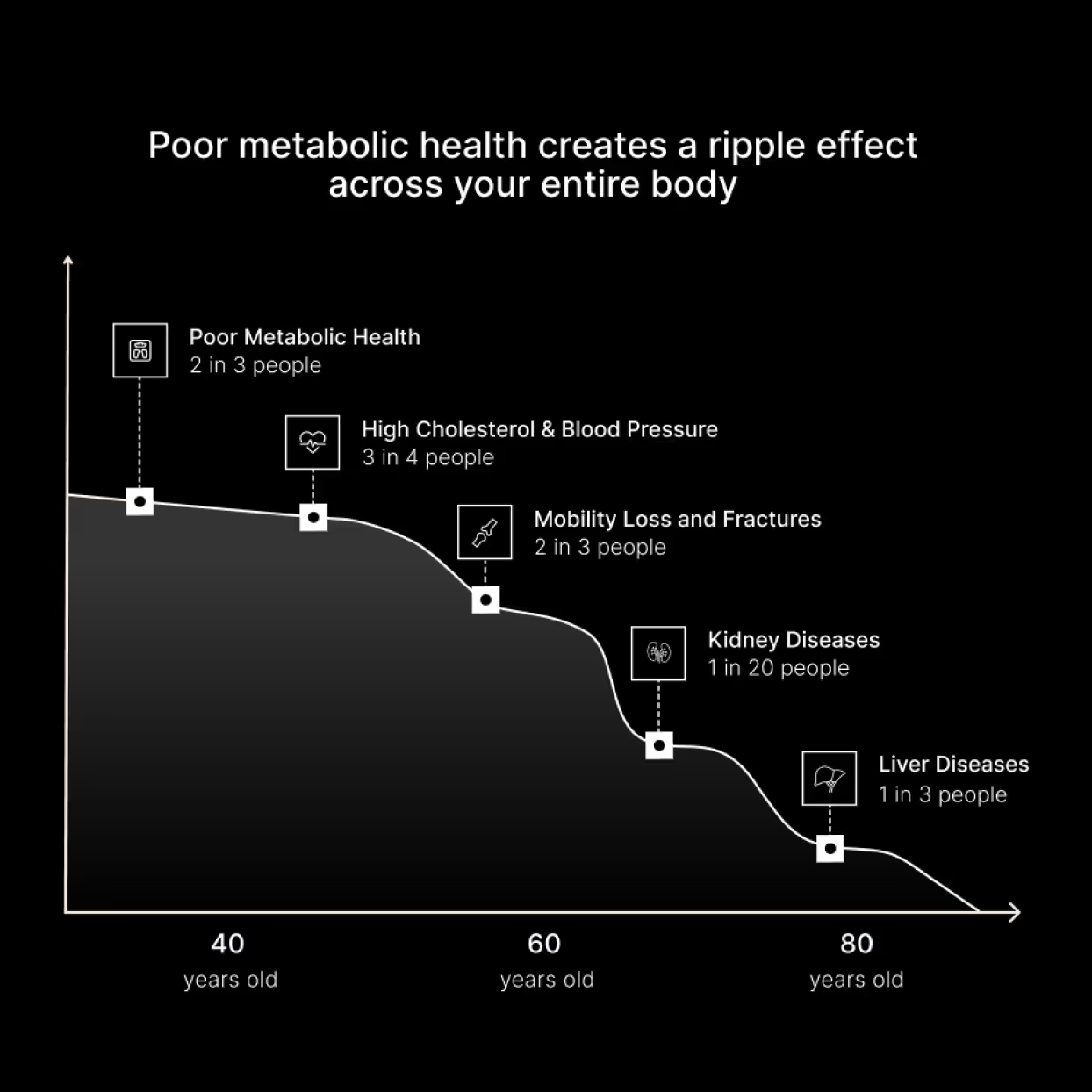Human longevity is gaining attention beyond health circles
The concept of human longevity has moved beyond niche health circles and is now capturing the attention of individuals and businesses alike.

In the realm of modern health, a quiet revolution is underway—one that is reshaping how we think about aging, disease prevention, and overall wellbeing. The concept of human longevity has moved beyond niche health circles and is now capturing the attention of individuals and businesses alike. This shift signifies more than a trend; it’s a movement toward proactive, technology-driven health management.
But what is driving this momentum, and why is longevity becoming a central focus for so many? Let’s explore how longevity is gaining traction and transforming the way we approach health.
The health industry is evolving. Medicine 1.0 focused on treating symptoms, while Medicine 2.0 emphasised diagnosing diseases earlier. Now, Medicine 3.0 takes a proactive stance, aiming not only to treat or detect disease but to prevent it entirely.
People are no longer satisfied with simply living longer—they want to live better. This shift has fueled the rise of longevity-focused programs, which offer comprehensive, forward-looking health evaluations that go beyond traditional health checks.

At its core, longevity is about optimising health to maximise not only lifespan but also healthspan—the number of years lived in good health. The average lifespan refers to the maximum years an individual can potentially live under optimal conditions, while life expectancy considers various demographic factors to estimate the years an individual is expected to live. Longevity health programs combine cutting-edge diagnostics, lifestyle insights, and advanced technology to give individuals a complete picture of their health trajectory.
Longevity isn’t just about detecting existing health problems. It’s about preventing them before they arise. Tools like DEXA scans for body composition, VO2 max tests for cardiovascular fitness, and continuous glucose monitors (CGM) for metabolic health provide a timeline of data that empowers actionable changes.
Longevity is influenced by a complex interplay of genetic, lifestyle, environmental, and healthcare factors. Genetics play a significant role in determining an individual’s lifespan, with certain genetic variants contributing to a longer or shorter life. However, lifestyle choices are equally crucial. A healthy diet, regular exercise, and adequate sleep can significantly impact longevity, promoting a healthier life and reducing the risk of age-related diseases.
Environmental factors also play a pivotal role. Access to clean air and water, safe living conditions, and strong social connections contribute to a longer and healthier life. Communities with better environmental conditions often see higher average lifespans. Additionally, better medical treatment and healthcare access can extend lifespan by preventing and treating age-related diseases. Advances in medical treatment have dramatically reduced mortality rates from chronic diseases, further contributing to greater longevity.
You can also calculate your biological age online to find a quick way to see how you're aging. However the online calculators are rarely as accurate as calculating it from a full blood panel.
The integration of AI, wearable tech, and advanced diagnostics has made longevity programs more accessible and impactful. By consolidating historical health data and leveraging predictive analytics, individuals can uncover trends and risks well before they manifest. Longevity studies play a crucial role in these technological advancements, providing valuable insights into extending life and addressing the challenges of verifying extreme claims about human life spans.

Preventative care often costs less than treating advanced diseases. Longevity health checks provide a cost-effective solution by identifying risks early and helping individuals make proactive lifestyle adjustments.
With a growing body of research linking lifestyle factors to chronic disease, more people are recognising the importance of prevention. Longevity programs appeal to anyone looking to take control of their health, from high-performing executives to young professionals and parents, emphasising the importance of a long life filled with vitality and wellbeing.
Businesses are starting to adopt longevity-focused health programs for their teams. By addressing employee wellbeing proactively, companies can reduce sick days, improve productivity, and create a healthier workplace culture. Supporting employee health over a long duration can lead to sustained benefits and a more resilient workforce.
Life expectancy is typically measured by calculating the average number of years a person is expected to live based on their current age and demographic characteristics. This involves using various statistical models and data sources, including mortality rates, population data, and health surveys. Measuring life expectancy is crucial for understanding population trends, planning healthcare services, and evaluating the effectiveness of health interventions.
However, it is essential to note that life expectancy is only an average. Individual lifespan can vary significantly based on genetic, lifestyle, and environmental factors. While life expectancy provides a useful snapshot of population health, it does not account for the unique circumstances that can influence an individual’s lifespan.
Longevity programs don’t stop at medical testing. Just as the longevity of a car's tires depends on driving habits and conditions, these programs integrate lifestyle assessments, focusing on areas like sleep, nutrition, mental health, and physical activity. These insights empower individuals to make sustainable changes that boost vitality and resilience.
Unlike traditional health checks, longevity programs are tailored to the individual. Factors like genetic predispositions, lifestyle habits, and health goals shape the evaluation and recommendations, ensuring each participant receives actionable and relevant advice.
Longevity research is a rapidly evolving field, with scientists exploring various ways to extend human lifespan and promote healthy aging. Current research focuses on understanding the biological mechanisms of aging, identifying genetic and lifestyle factors that influence longevity, and developing interventions to prevent or treat age-related diseases.
Emerging areas of research include senolytics, which target and eliminate aging cells, gene editing technologies like CRISPR, and personalised medicine tailored to an individual’s genetic makeup. These advancements hold promise for extending human lifespan and improving healthspan. As research progresses, we can expect to see new therapies and interventions that promote healthier and longer lives, transforming the typical lifespan into one marked by vitality and reduced chronic diseases.

For those considering a shift to longevity-focused health, here are some key benefits:
At Everlab, we’re proud to be at the forefront of this health revolution. Our longevity health checks blend the best aspects of traditional and preventative care into a streamlined, four-hour experience.
With state-of-the-art diagnostics, access to expert clinicians, and a personalised health action plan, we empower individuals to take charge of their wellbeing. Plus, our Everlab app makes it easy to monitor progress, track data, and stay connected with your care team.
Join the movement. Explore how Everlab’s longevity programs can help you live better, longer.
The Bottom Line
Longevity is no longer a future concept—it’s here, reshaping how we approach health and aging. By focusing on prevention, personalisation, and technology, longevity programs offer a pathway to not just a longer life, but a healthier, more fulfilling one.
Are you ready to take the next step in your health journey? Let longevity lead the way.
In conclusion, longevity is a complex and multifaceted concept influenced by a range of genetic, lifestyle, environmental, and healthcare factors. Understanding these factors is essential for promoting healthier and longer lives. By measuring life expectancy and evaluating the effectiveness of health interventions, we can better plan healthcare services and improve population health.
As longevity research continues to evolve, we can expect to see new and innovative ways to extend human lifespan and promote healthy aging. By adopting a healthier lifestyle, staying informed about the latest research, and advocating for better healthcare access, individuals can take proactive steps towards living a longer and healthier life.




Join 1000's of Australians improving their health with proactive, personalised healthcare.